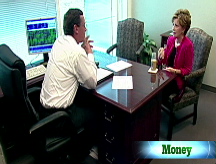New doubts about a once sure bet
Annuities were considered the ultimate safe investment - until insurers started wobbling. Can you still count on one?
 |
| Walter Updegrave is a senior editor with Money Magazine and is the author of "How to Retire Rich in a Totally Changed World: Why You're Not in Kansas Anymore" (Three Rivers Press 2005). |
(Money Magazine) -- Retirement investors have long viewed annuities as an effective way to protect their nest egg. But the recent financial crisis has highlighted an inherent paradox: While annuities offer safety and guarantees, their benefits are tied to the financial strength of an insurer. If the company fails, you could be looking at a loss in the very part of your portfolio that you were counting on to be rock solid.
So at a time when one of the world's largest insurers, AIG, has needed government help to stay solvent and other insurers have seen their stocks drop 70% or more in just a few months, should you still consider putting a portion of your retirement assets in an annuity?
I believe the answer is yes. With their unique features - in particular an immediate or income annuity's ability to turn your savings into lifetime payments - annuities can play a valuable role in your retirement. But given the heightened level of risk today, it's more important than ever to follow a few crucial steps when you shop for an annuity. Otherwise, you may be buying only the illusion of security.
I get lots of e-mails about annuities. And what's strikingly clear is that the majority of annuity holders have a pretty vague notion of what they own.
For example, you may know that a return or monthly payment is guaranteed, but do you know how that promise works? Many variable annuities tout guaranteed growth rates of 5% or more a year. What you may not realize is that this return typically applies not to your account value but to the annuity's "benefit base," a hypothetical value the insurer uses to calculate how much income you can draw from your annuity. If the market drops and you want to cash out, you'd get your actual account value, which could be down right along with the market.
Before you commit to an annuity, demand that the salesperson explain what you're buying in terms you comprehend.
Few investments can match annuities when it comes to confusing fees. Variable annuities, for example, have three layers of annual costs - insurance charges, investment fees and the cost of guarantees and riders - that can easily total 2% to 3%. Surrender fees - what you may owe when you exit the annuity - can range as high as 15%.
These fees are buried in pages of bewildering prose in the prospectus or contract. A consortium of insurance groups is working on ways to simplify fee disclosure. Until that becomes a reality, ask your adviser to break down each fee separately in writing and total them. Better yet, have the adviser fill out the simplified disclosure checklist I proposed last year.
To date, no major insurer has failed in this crisis. But when you see firms like Lehman Brothers bite the dust, it's clear that anyone can go down if a meltdown is severe enough.
To reduce your odds of getting swept up in a failure, stick to insurers that get grades of A or better from ratings firms like Standard & Poor's and A.M. Best. That may mean accepting a lower yield or payout, but you're not looking to take chances with this money.
For an additional measure of safety, divvy up your money among two or three insurers. All states have guaranty associations that provide coverage of $100,000 or more per insurer (find your state's limit at nolhga.com). By keeping your exposure to any single firm below your state's coverage ceiling, you ensure you'll be fully covered even in a worst-case scenario.
Have you found a way to pay for your child's college education without taking on too much debt? Did you choose a university based on its lower cost or loan programs, research scholarships, or just save up and pay in full? We want to hear from you. Send your stories to pwang@moneymail.com and you could be featured in an upcoming story.
For more retirement and investment advice from Updegrave, including videos and his twice-weekly Ask the Expert column, go to cnnmoney.com/expert. E-mail him at longview@moneymail.com. ![]()



